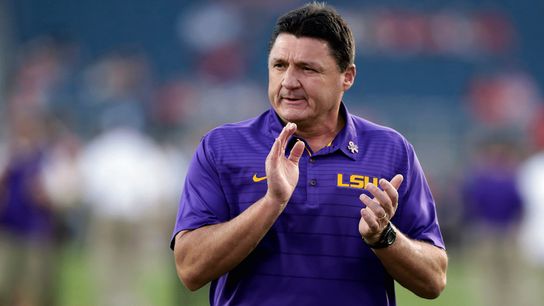To be clear, all of this is part of the deal. At a base level, it's what you want. If you aren't losing your guys to bigger jobs at a place like LSU, you're probably doing something wrong.
After all, Alabama's staff has almost completely turned over from its 2017 title team, to say nothing of the now-ancient 2009 championship run.
Still, in the moment, it feels like a lot.
LSU has already lost its defensive coordinator and its passing game coordinator to bigger jobs, in moves you already know about: Joe Brady to the Panthers, Dave Aranda to Baylor. (Damn you, Matt Rhule.)
But now LSU has lost four of its key behind-the-scenes contributors.
First, offensive analyst Jorge Munoz -- a former coordinator himself at Louisiana-Lafayette, and initially speculated as a candidate to slide into Brady's role -- instead chose to join Aranda at Baylor.
Then, offensive GA John Decoster left to become the tight ends coach at Old Dominion. Dennis Johnson, a defensive analyst who would have been on the Tigers on-the-field staff had he not injured both knees over the summer, also joined Aranda at Baylor.
And now, longtime defensive analyst Ronnie Wheat is leaving to coach safeties at Nevada.
LSU should be nothing but happy for all of its departing staffers, and Wheat especially. He spent seven years on the support staff, working under coordinators John Chavis and Kevin Steele before Aranda, and he was an integral part of developing and recruiting the linebacker position for LSU. The Nevada job will be Wheat's first on-the-field job, and he more than earned it.
None of those losses are a crippling blow on their own, even Brady. But, taken as a whole, it's a lot to replace in one offseason.
And that says nothing of what the Tigers lose on the field.
Again, change is the nature of life, and especially college football. Coaches change jobs at around 20 percent a year across the industry, and the roster is guaranteed to experience a 100 percent turnover every five years.
But it sure does feel like a lot of talent just walked out the door at LSU's football building, does it not?
LSU enjoyed a magical season in 2019, and these departures are the price of that. It's a deal LSU and every program in the country would take 100 times out of 100. LSU lost lots of good players, but on the whole they'll keep more talent than they lost, then turn around and sign even more good players. The nearly-complete 2020 class ranks fourth nationally, led by a generational talent in 5-star tight end Arik Gilbert, 5-star cornerback Elias Ricks and 5-star cornerback Kayshon Boutte. Five-star running back John Emery plus 4-stars Chris Curry and Tyrion Davis-Price will get a chance to shine now that Clyde Edwards-Helaire went pro. Biletnikoff Award winner Ja'Marr Chase plus 5-star wideout Terrace Marshall are back for another year, and Derek Stingley will be perhaps the most talented non-quarterback in college football next year -- as a sophomore.
Seriously, Stingley might be the second coming of Charles Woodson. (Look him up, kids.)
Talent has never been a problem for LSU, at least not among the guys in helmets and pads. It's been the coaching staff and the overall approach that held LSU back for years. Ed Orgeron solved that problem in 2019, and we all saw the results.
Now, O's job is to carry the program's gold-encrusted momentum forward, to turn 2019 from simply a magical season into a paradigm-shifting year. To make 2019 do for LSU what 2009 did for Alabama and what 2016 did for Clemson -- and to avoid Florida State's fate after its 2013 title run.
To do so, Orgeron must nail his efforts in restocking his coaching staff. Not just the coordinator hires (Bo Pelini is already in place as defensive coordinator) but the second- and third-level hires as well, the guys who don't get their own ESPN camera trained on them during big games, but who keep the machine humming.
That work begins now.
